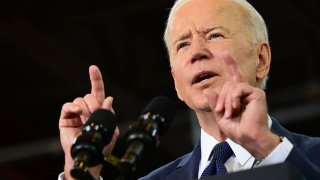
- President Biden has asked Education Secretary Miguel Cardona to prepare a memo on the president's legal authority to cancel up to $50,000 in student debt.
- Although Biden has expressed reluctance at bypassing Congress to forgive the loans, he's been under mounting pressure from members of his own party, borrowers and advocates to do so.
- Even before the pandemic, around a quarter of student loan borrowers were in delinquency or default.
President Joe Biden has requested that Education Secretary Miguel Cardona prepare a report on the president's legal authority to cancel up to $50,000 in student debt per borrower, White House chief of staff Ron Klain said in an interview on Thursday with Politico.
"Hopefully we'll see that in the next few weeks," Klain said of the memo. "And then he'll look at that legal authority, he'll look at the policy issues around that and he'll make a decision."
On the campaign trail, Biden said he supported $10,000 in student loan forgiveness, but he is under mounting pressure from members of the Democratic Party, advocates and borrowers to go further by canceling $50,000 per person and to do so through executive action.
Get South Florida local news, weather forecasts and entertainment stories to your inbox. Sign up for NBC South Florida newsletters.
Although Biden in the past has expressed reluctance at bypassing Congress to cancel student debt, White House press secretary Jen Psaki suggested in February that the administration hadn't ruled out the possibility. On his first day in office, Biden extended a pause on payments for federal student loan borrowers that has been in effect since March until this coming September.
Senate Majority Leader Sen. Chuck Schumer, D-N.Y., said he's come to the conclusion that Biden can forgive $50,000 of the debt on his own.
"You don't need Congress," Schumer has said. "All you need is the flick of a pen."
Money Report
During the 2020 Democratic presidential primary, Massachusetts Sen. Elizabeth Warren vowed to forgive student loans in the first days of her administration, including with the announcement an analysis written by three legal experts, based at the Project on Predatory Student Lending at Harvard Law School, who described student debt forgiveness through executive action as "lawful and permissible."
Others say Biden would run into court challenges if he tried to nix the debt on his own.
More from Personal Finance:
Here's when state tax returns are due
There may still be a way to claim missing $1,200 or $600 stimulus check
These states aren't allowing the $10,200 unemployment tax break
If it was determined that the president was able to cancel student debt without passing legislation, borrowers could see their balances reduced or eliminated overnight. On the other hand, the chances of Congress agreeing to forgive the loans is, at best, uncertain given Democrats' razor-thin majority.
"I think the administration is searching hard for a legally justifiable way to discharge up to $10,000," said A. Wayne Johnson, who was formerly in charge of federal student loan debt at the U.S. Education Department.
At the same time of his resignation in 2019, Johnson called for $50,000 in student loan forgiveness per borrower, saying that the system in the U.S. was bordering on predatory and that a large share of the debt would never be repaid.
$10,000 or $50,000
There are more than 44 million student loan borrowers in the U.S., and the country's outstanding balance is expected to exceed $2 trillion by 2022.
If all federal student loan borrowers got $10,000 of their debt forgiven, the outstanding education debt in the country would fall to around $1.3 trillion, from $1.7 trillion, according to higher education expert Mark Kantrowitz.
And one-third of federal student loan borrowers, or 14.4 million people, would see their balances reset to zero.
Canceling $50,000 for all borrowers, on the other hand, would shrink the country's outstanding student loan debt balance to $700 billion, from $1.7 trillion.
Meanwhile, the $50,000 plan would forgive all of the debt for 80% of federal student loan borrowers, or 36 million people, Kantrowitz said.
Even before the pandemic, around a quarter of student loan borrowers were in delinquency or default.






